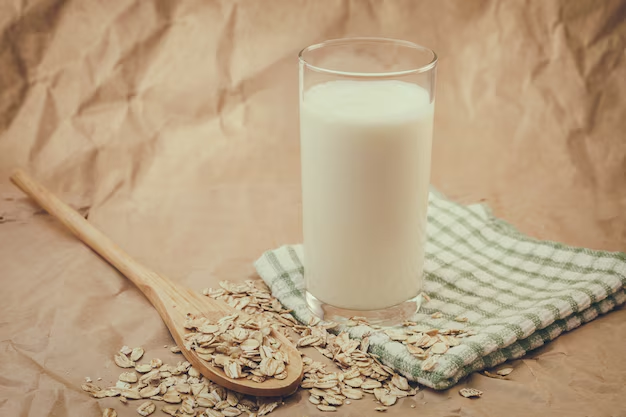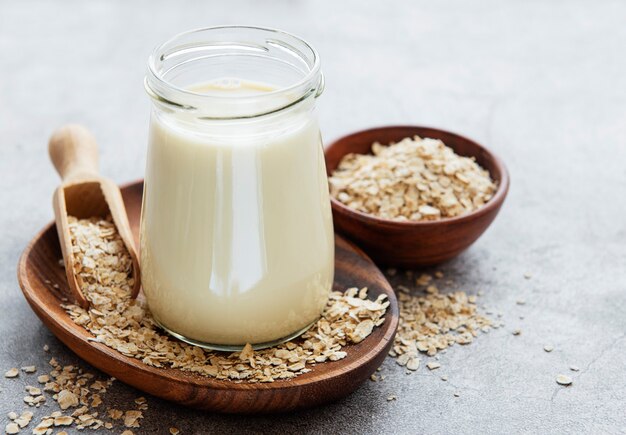Oat milk has become a staple in coffee shops and grocery aisles, especially in the U.S., thanks to its creamy texture and plant-based appeal. It is often marketed as a healthier and more sustainable alternative to dairy milk. But is oat milk truly healthy? This article delves into its nutritional profile, health benefits, and potential downsides to provide a comprehensive understanding.
What Is Oat Milk?
Oat milk is a plant-based alternative to dairy milk that has gained immense popularity in recent years. It is celebrated for being vegan-friendly, lactose-free, and environmentally sustainable.
How Is Oat Milk Made?
The production process of oat milk is simple yet effective:
- Blending Oats with Water: Whole oats are soaked and blended with water until smooth.
- Straining the Mixture: The liquid is then strained to separate the milk from oat pulp, resulting in a creamy, nutrient-rich beverage.
- Fortification: Many manufacturers add vitamins and minerals like calcium and vitamin D to enhance nutritional value.
This straightforward method preserves the oats’ natural nutrients while creating a versatile product suitable for various dietary needs.
Nutritional Profile of Oat Milk
Understanding the nutritional makeup of oat milk is essential to assess its health impact.
Caloric Content and Macronutrients
- Calories: A standard cup of unsweetened oat milk contains around 120 calories. Sweetened varieties may have significantly more.
- Carbohydrates: Oat milk is rich in carbohydrates, mainly from natural sugars found in oats. A single serving may provide 16–19 grams of carbs.
- Fats and Proteins: It is relatively low in fat (2.5–5 grams) and protein (2–3 grams), depending on the brand.
Comparison With Other Milks
- Cow’s Milk: Oat milk has fewer proteins but is comparable in calories to 2% cow’s milk.
- Other Plant-Based Milks: Almond and soy milk often have fewer calories and more protein, respectively. However, oat milk stands out for its creaminess and carbohydrate content.
Fortified Nutrients
Commercial oat milk is often fortified with essential nutrients such as:
- Calcium: Critical for bone health.
- Vitamin D: Enhances calcium absorption.
- Vitamin B12: Essential for vegans, as it supports nerve function and red blood cell production.
Health Benefits of Oat Milk
Oat milk offers several health advantages, thanks to its nutrient composition.

Heart Health
Oat milk is a heart-healthy choice due to its beta-glucan content.
- Beta-Glucans: These are soluble fibers that form a gel-like substance in the gut.
- Cholesterol Reduction: Beta-glucans help reduce LDL (“bad”) cholesterol by binding to it and removing it from the body. Regular consumption may lower the risk of heart disease.
Digestive Health
The fiber content in oat milk promotes a healthy digestive system.
- Gut Health: Fiber aids in maintaining a balanced gut microbiome.
- Bowel Regularity: It can prevent constipation by supporting regular bowel movements.
Bone Health
Oat milk supports bone health through its fortified nutrients.
- Calcium: Essential for maintaining strong bones and preventing osteoporosis.
- Vitamin D: Enhances calcium absorption and supports overall bone density.
Fortified oat milk is particularly beneficial for individuals who avoid dairy products.
Potential Downsides of Oat Milk
Despite its benefits, oat milk is not without its drawbacks. Consumers should be aware of certain limitations.
Added Sugars
Some oat milk varieties contain added sugars, which can diminish its health benefits.
- Health Risks: Excess sugar can lead to weight gain, increased blood sugar levels, and a higher risk of diabetes.
- Tips: Opt for unsweetened versions to minimize sugar intake.
Gluten Contamination
Although oats are naturally gluten-free, cross-contamination can occur during processing.
- Celiac Disease and Gluten Sensitivity: Individuals with these conditions must choose certified gluten-free oat milk.
Lower Protein Content
Oat milk contains less protein compared to cow’s milk and soy milk.
- Impact on Satiety: Lower protein levels may not keep you feeling full for as long as other milk alternatives.
- Considerations: For those needing higher protein intake, oat milk may not be the best choice.
Related to Read: Leftover Oatmeal Recipe
Environmental Impact of Oat Milk
Oat milk stands out as a more sustainable option compared to dairy and other plant-based milks. Its production requires fewer resources, making it a preferred choice for environmentally conscious consumers.
Comparison With Dairy Milk and Other Plant-Based Milks
- Water Usage:
- Dairy milk production uses significantly more water than oat milk. Producing one liter of oat milk requires about 48 liters of water, while cow’s milk can use up to 628 liters.
- Almond milk, another popular plant-based alternative, requires about 371 liters per liter due to the high water demand of almond farming.
- Land and Greenhouse Gas Emissions:
- Dairy farming demands extensive land use and is a significant source of methane emissions.
- Oat milk has a lower carbon footprint than dairy milk and plant-based milks like almond and soy. Oats are grown in cooler climates, requiring fewer pesticides and fertilizers, reducing emissions.
Sustainability Considerations for U.S. Consumers
In the U.S., many oat milk brands source oats from North American farms, reducing transportation emissions. Choosing brands that prioritize sustainable farming practices and recyclable packaging can further minimize environmental impact.
Who Should Consider Oat Milk?
Oat milk isn’t just a trendy beverage; it’s a practical choice for many people based on dietary and ethical considerations.
Individuals With Lactose Intolerance or Dairy Allergies
For those who cannot digest lactose or have a dairy allergy, oat milk offers a safe and tasty alternative. It’s naturally lactose-free and less likely to trigger allergic reactions compared to nut-based milks.
Vegans and Those Following Plant-Based Diets
As a completely plant-based product, oat milk fits seamlessly into vegan and vegetarian diets. It’s an ethical choice for individuals avoiding animal products.
People Seeking to Reduce Their Environmental Impact
If you’re looking to lower your carbon footprint, switching from dairy to oat milk is a significant step. Its minimal resource usage makes it one of the most sustainable milk options available.
How to Choose the Best Oat Milk
With so many oat milk brands on the market, it’s essential to select one that aligns with your health and dietary needs.
Opt for Unsweetened and Fortified Options
- Why Unsweetened? Sweetened varieties can contain added sugars, which contribute to weight gain and blood sugar spikes.
- Fortification Benefits: Look for brands fortified with calcium, vitamin D, and vitamin B12 to support bone health and overall nutrition.
Read Labels for Additives and Preservatives
Some brands include thickeners, stabilizers, or oils, which may not suit everyone. Checking the ingredient list ensures you’re avoiding unnecessary additives.
Consider Certified Gluten-Free Products
If you have celiac disease or gluten sensitivity, choose oat milk labeled “certified gluten-free” to avoid cross-contamination during processing.
Related to Read: Monday Musings + Super Healthy Oatmeal Raisin Cookies
Making Oat Milk at Home
Making oat milk at home is simple, cost-effective, and gives you control over the ingredients.

Simple Recipe
Ingredients:
- 1 cup rolled oats
- 4 cups water
- Optional: a pinch of salt, sweetener (like dates), or vanilla extract
Steps:
- Combine oats and water in a blender. Blend for 30–45 seconds.
- Strain the mixture using a fine-mesh strainer or cheesecloth.
- Pour the milk into a bottle and refrigerate. Shake well before use.
Advantages of Homemade Oat Milk
- No Additives: You control exactly what goes into your milk.
- Cost-Effective: Homemade oat milk is often cheaper than store-bought options.
- Customizable: Adjust sweetness, thickness, and flavor to your liking.
Incorporating Oat Milk Into Your Diet
Oat milk is incredibly versatile and works well in a variety of dishes and beverages.
How to Use Oat Milk
- Coffee and Tea: Its creamy texture makes it an excellent choice for lattes and cappuccinos.
- Smoothies: Add it to your favorite smoothie for a boost of creaminess.
- Cereal and Oatmeal: Pour it over cereal or use it to cook oatmeal for a double-oat breakfast.
- Baking: Substitute oat milk for dairy milk in recipes like muffins, pancakes, and cakes.
Flavor Pairings
Oat milk’s neutral flavor pairs well with ingredients like:
- Vanilla, cinnamon, and nutmeg for sweet dishes.
- Spinach, kale, and parsley in savory smoothies.
Related to Read: Cream of Wheat Vs Oatmeal: The Differences Will Surprise You!
Conclusion
Oat milk is a nutritious, eco-friendly alternative to dairy milk that suits a wide range of dietary needs. Its creamy texture, health benefits, and minimal environmental impact make it a favorite among consumers. While it has some downsides, such as lower protein content and potential added sugars, these can be managed by choosing the right products or making it at home. Whether you’re vegan, lactose-intolerant, or simply looking to try something new, oat milk is worth considering.
FAQs
1. Is oat milk healthier than cow’s milk?
Oat milk is healthier for individuals who are lactose-intolerant or allergic to dairy. It’s also lower in saturated fat. However, cow’s milk has more protein, making it a better choice for muscle building and satiety.
2. Can I drink oat milk every day?
Yes, oat milk can be consumed daily as part of a balanced diet. Opt for unsweetened and fortified versions to maximize its benefits.
3. Is homemade oat milk better than store-bought?
Homemade oat milk allows you to control ingredients and avoid additives. However, store-bought versions often contain added nutrients like calcium and vitamin D.
4. Does oat milk work well in coffee?
Yes, oat milk’s creamy texture makes it an excellent choice for coffee. Many baristas prefer it for lattes and cappuccinos.
5. Is oat milk safe for children?
Oat milk can be a safe option for children, especially those with dairy allergies. Ensure the product is fortified to meet their nutritional needs.


